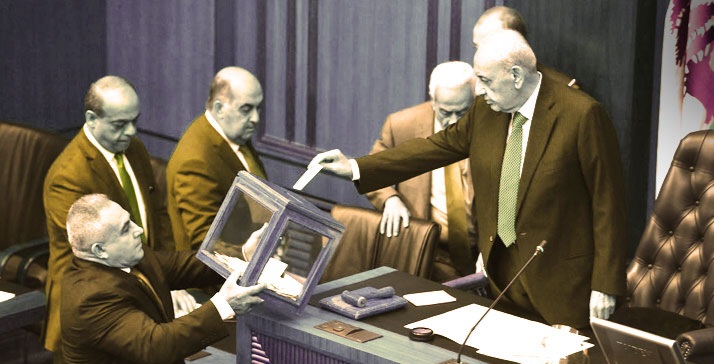This stalemate is hampering fundamental economic reforms and at the same time putting the brakes on the daily life, to an extent that the national television could not afford broadcasting rights for the World Cup.
Why is the Lebanese parliament in an impasse?
The presidential term of the latest president ended on October 30. After Aoun’s departure, the parliament convened 9 times but each time, it declined to reach a consensus on a new choice. This situation has aggravated the political paralysis in the country and blocked the necessary measures to alleviate the impacts of economic crisis that has forced three quarters of the Lebanese under the poverty line.
Al-Arabi Al-Jadid news outlet has reported that the weekly parliamentary sessions are turning into a “joke” as the parliamentarians cast blank ballots. They, it added, often leave the sessions incomplete and thus a quorum for voting is usually out of reach.
Lebanon has repeatedly witnessed political paralyses throughout its short and troubled history. For example, in 2016, it faced a presidential vacuum. Before that, in 2008, the election of the president in Lebanon had led to a dispute and then a street conflict, and finally, after two years, the politicians at the Doha meeting managed to reach a consensus on a candidate for the presidency. Political paralysis in Lebanon typically occurs when regional countries, including Saudi Arabia and other Persian Gulf Arab states, which once injected considerable cash into their close Lebanese political parties’ pockets, tie their funding continuation to realization of their goals, including confronting groups opposed to Riyadh influence in the country. Under such a situation, the political groups affiliated with and supported by Riyadh or Abu Dhabi run counter to other groups, mainly Hezbollah and its allies that are opposed to the Saudi interference in Lebanon’s home affairs and the election of a president becomes a Gordian knot.
A year ago, Saudi Arabia banned the imports of agricultural products from Lebanon under the ruse of drug trafficking, and at the end of the same year, after one of the ministers of the Lebanese cabinet called Saudi Arabia’s war in Yemen absurd and unfair, Riyadh banned exports to and imports from Lebanon and any government transactions with Lebanon. These reactions from Riyadh indicate the high level of influence of Lebanon’s reception of influence from the Saudi agenda, and of course, the highest level of influence is caused by parties aligned with the Saudis.
Mohanad Ali, an expert at Carnegie’s New Arab Institute, suggests that Saudi Arabia obviously ties Lebanon and Yemen cases to other issues in the region and tries to make itself the main gainer of the Lebanese developments.
Also, Karim Emil Bitar, a professor of international affairs at Saint Joseph University, believes that to elect a president in Lebanon, first there should be an agreed-upon figure that is not rejected by the key foreign actors in Lebanon’s developments, and regional powers like Saudi Arabia should approve of him.
Ibrahim Manima, an independent lawmaker of the Lebanon’s parliament, told Al-Arabi Al-Jadid that the current president election stalemate is because the traditional parties awaiting foreign meddling to settle the crisis and this stalemate occurred several times.
Who are the candidates?
According to the system of ethnic power sharing in Lebanon, since the country’s independence from France in 1943, the president must be of Maronite Catholic ethnicity. Also, the prime minister is elected from the Sunnis and the speaker of the parliament is also elected from the Shiites.
While Hezbollah has not officially named a candidate yet, it is widely believed that the Shiite movement supports Suleiman Frangieh. The main candidate of the opposite camp is Michel Moawad, a member of parliament. Both of these candidates are from the political and influential families of Lebanon.
Although Moawad has considerable vote base, he has failed to win the majority required to secure the post of president, with some factions calling him too divisive to secure the presidency. At the same time, General Jeseph Aoun is another potential candidate for the post, though he is not officially named yet.
Additionally, Gibran Bassil, the former foreign minister and the son-in-law of ex-President Michel Aoun and the head of Free Patriotic Union and an ally of Hezbollah, is seen a replacement to Aoun for now. He is targeted by the American sanctions, however.
What are the consequences of current deadlock?
A Western diplomat told the AP that Lebanon’s political parties are playing a ‘waiting game.’ At the same time, with the continuation of the deadlock over the appointment of the president, the tensions between the political groups will grow worse and more heightened.
Hezbollah’s Deputy Secretary-General Sheikh Naim Ghassem recently outlined the movement’s stances and stressed that it would support any choice not seeking to implement the American-Israeli project in Lebanon.
On the other side, Charles Jabour, the spokesman to the pro-Western Lebanese Forces party, accused Hezbollah and its allies of insisting on their favorable candidates.
Some economists have warned that if Lebanon’s economic paralysis lasts for more than a few weeks or months, a full economic collapse is unavoidable.
Lebanon now has world's second highest inflation rate and
continuation of the current situation means intensification of incessant
crises in the country’s economy.
/129

